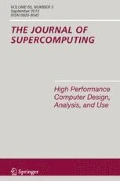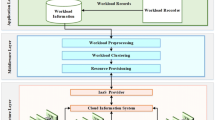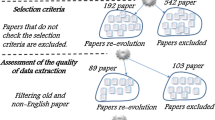Abstract
The dynamic distributed real-time applications run on clusters with varying execution time, so re-allocation of resources is critical to meet the applications’s deadline. In this paper we present two adaptive recourse management techniques for dynamic real-time applications by employing the prediction of responses of real-time tasks that operate in time sharing environment and run-time analysis of scheduling policies. Prediction of response time for resource reallocation is accomplished by historical profiling of applications’ resource usage to estimate resource requirements on the target machine and a probabilistic approach is applied for calculating the queuing delay that a process will experience on distributed hosts. Results show that as compared to statistical and worst-case approaches, our technique uses system resource more efficiently.
Similar content being viewed by others
References
Liu CL, Layland JW (1973) Scheduling algorithms for multi-programming in a hard-real-time environment. Journal of the ACM 20:46–61
Audsley NC, Burns A, Richardson MF, Wellings AJ (1991) Hard real-time scheduling: The deadline-monotonic approach. Proceedings of 8th IEEE Workshop on Real-Time Operating Systems and Software
Haban D, Shin KG (1990) Applications of real-time monitoring for scheduling tasks with random execution times. IEEE Transactions on Software Engineering 16(12):1374–1389
Tia TS, Deng Z, Shankar M, Storch M, Sun J, Wu LC, Liu JWS (1995) Probabilistic performance guarantee for real-time tasks with varying computation times. Proceedings of the 1st IEEE Real-Time Technology and Applications Symposium. IEEE Computer Society Press, pp. 164–173
Lehoczky JP (1996) Real-time queueing theory. Proceedings of IEEE Real-Time Systems Symposium. IEEE CS Press, pp. 186–195
Abeni L, Buttazzo G (1998) Integrating multimedia applications in hard real-time systems. Proceedings of the 19th IEEE Real-Time Systems Symposium. IEEE Computer Society Press, pp. 3–13
Atlas A, Bestavros A (1998) Statistical rate monotonic scheduling. Proceedings of the 19th IEEE Real-Time Systems Symposium. IEEE Computer Society Press, 123–132
Audsley NC (1990) Deadline Monotonic Scheduling. (Report YCS-90-146), Department of Computer Science, York University
Ramamritham JA, Zhao SW (1989) Distributed scheduling of tasks with deadlines and resource requirements. IEEE Transactions on Computers 38(8):110–123
Stewart DB, Khosla PK (1997) Mechanisms for detecting and handling timing errors. Communications of the ACM 40(1):87–93
Puschner P, Burns A (2000) A review of worst-case analysis. The International Journal of Time-Critical Computing Systems 18:115–128
Burns F, Koelmans A, Yakovlev A (2000) WCET analysis of superscalar processors using simulation with coloured petrinets. The International Journal of Time-Critical Computing Systems 18:275–288
Welch LR, Shirazi B (1999) A dynamic real-time benchmark for assessment of QoS and resource management technology. IEEE Real-Time Application Systems
Pressman RS (1996) Software engineering: A practitioner’s approach. McGraw-Hill Companies
Author information
Authors and Affiliations
Corresponding author
Rights and permissions
About this article
Cite this article
Huh, EN., Welch, L.R. Adaptive resource management for dynamic distributed real-time applications. J Supercomput 38, 127–142 (2006). https://doi.org/10.1007/s11227-006-7554-4
Issue Date:
DOI: https://doi.org/10.1007/s11227-006-7554-4




